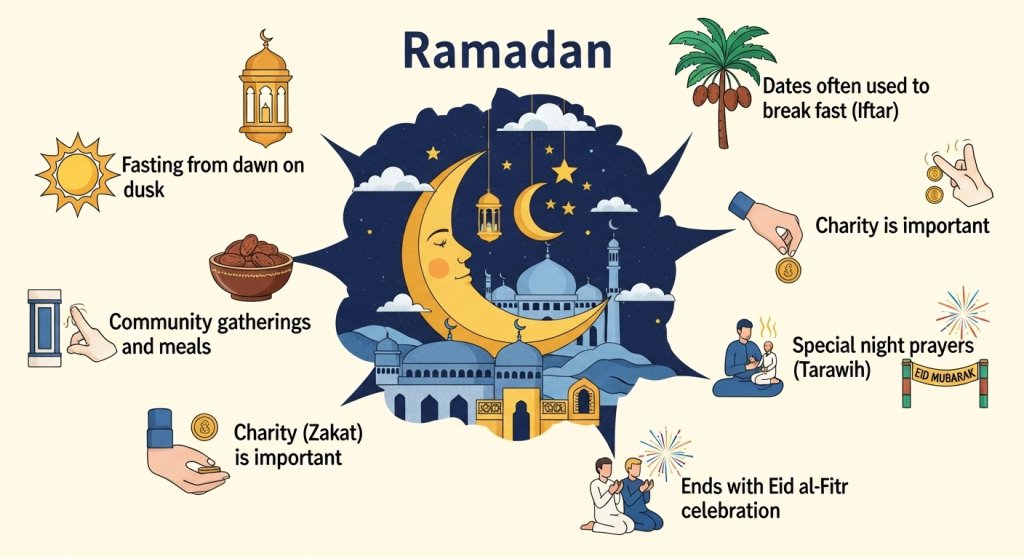Ramadan is the ninth and holiest month in the Islamic calendar. For Muslims around the world, it is a time of fasting, prayer, and reflection. In this article, we’ll explore some key ramadan facts in arabic that will help you understand the religious and cultural significance of this important month. By learning about the History of Ramadan and its special practices, you can gain a deeper appreciation for this time of spiritual devotion and self-improvement.
Ramadan Facts in Arabic: Key Facts About the Holy Month
Fasting during Ramadan is one of the five pillars of Islam, but there is more to this month than just abstaining from food and drink. Here are some of the most important facts about this month.
- The Timing: The lunar calendar determines the Ramadan Beginning and end dates, which means Ramadan starts and ends on different dates every year. Muslims around the world wait for the sighting of the new crescent moon to announce the beginning of the month.
- The Purpose of Fasting: The practice of Fasting from dawn until sunset aims to elevate the spirit by teaching self-discipline, patience, and empathy for the poor and hungry. It is a time to cleanse the body and soul and to remember God. In short, fasting is intended to elevate the spirit.
- Who Must Fast: While fasting is a central practice, not everyone must fast. Children, the elderly, those who are ill, pregnant women, and travelers all have an excuse from fasting.
- Special Prayers: In addition to the five daily prayers, Muslims perform special nightly prayers called tarawih. Muslims often hold these prayers at a mosque.
- The Quran: Recitation of the Quran is a central part of Ramadan. Muslims believe that God first began revealing the Quran to the Prophet Muhammad during this month in A.D. 610. Muslims often recite the entire text of the Quran in mosques over the course of the month.
Religious Practices in Ramadan
Ramadan is a month of intense Religious practices. The days are filled with worship, and the nights are full of community and prayer.
- Suhur and Iftar: Before the sun rises, Muslims wake up to eat a pre-dawn meal called Suhur. This meal gives them energy for the day of fasting. After the sun sets, they break their fast with a meal called Iftar. The Iftar meal is often a big celebration with family and friends. The fast is traditionally broken with dates, just as the Prophet Muhammad did.
- Laylat al-Qadr: One of the most significant nights in Islam is Laylat al-Qadr, or “The Night of Power.” Muslims believe this is the night when the Quran was first revealed. People consider this night to be “better than a thousand months” of worship. Many Muslims spend this night praying and reading the Quran in hopes of receiving blessings.
- Charity: Charity is an important practice. Towards the end of the month, Muslims donate to the poor through a special charitable donation called zakat al-fitr, which helps those who are less fortunate celebrate the festival of Eid.
Other Important Ramadan Facts
- Ramadan in Polar Regions: For Muslims who live in places with very long days, such as the Arctic, fasting can be a challenge. Muslims often adapt the rules for Ramadan in polar regions. They can choose to follow the sunrise and sunset of a nearby city or a more traditional time zone.
- Employment During Ramadan: In many Arab countries, employers reduce work hours during Ramadan to help Muslims manage their fasting and prayer schedule. Employment during Ramadan often shifts to a shorter workday.
- The Meaning of the Name: The word “Ramadan” comes from the Arabic root ramida (رمض), which means “scorching heat” or “dryness.” This name may refer to the high temperatures of the season or the feeling of intense thirst and hunger from fasting.
- Differences in How Ramadan is Observed: While the core practices are the same, many differences in the way Ramadan is observed from country to country exist. These cultural variations can be seen in the types of food people eat at Iftar, the music played, and local traditions for decorating and celebrating.
- Islamic Events during Ramadan: Many significant Islamic events have taken place during Ramadan. For example, the Battle of Badr, one of the first major battles in Islam, occurred during this holy month.
- The End of Ramadan: The month of Ramadan ends with a three-day festival called Eid al-Fitr. It is a time for feasting, giving gifts, and celebrating with family and friends.
Conclusion
Ramadan is a month of deep meaning, and understanding these ramadan facts in arabic is a wonderful way to connect with Islamic culture. From the spiritual practices to the communal celebrations, this month is a time of growth and joy. The History of Ramadan shows us that it is not just a holiday; it is a timeless tradition of faith, discipline, and community.
To continue your journey into the richness of the Arabic language and its cultures, consider using the Kaleela app. It provides comprehensive lessons on Modern Standard Arabic and various dialects, helping you master not just the words but also the traditions behind them.



